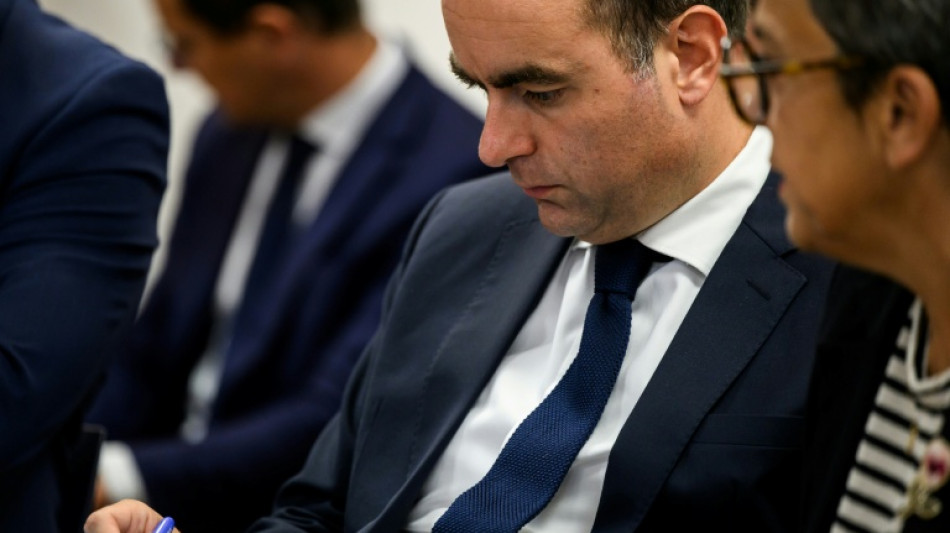

France's new PM courts the left a day after ratings downgrade
France's new Prime Minister Sebastien Lecornu held out an olive branch to the left on Saturday, ruling out his predecessor's plan to cut two public holidays to help slash the deficit.
His gesture came a day after the Fitch ratings agency downgraded France's credit rating -- measuring its ability to pay back debts -- from "AA-" to "A+".
The US agency, one of the top global institutions gauging the financial solidity of sovereign borrowers, also warned that France's debt mountain would keep rising until 2027 unless urgent action was taken.
Political leaders on the far right and hard left laid the blame at the feet of President Emmanuel Macron, calling for a break from his politics.
Lecornu, less than a week in the job, announced in an interview with the regional press that he was dropping one of the most controversial policies of his predecessor Francois Bayrou.
"I have decided to withdraw the suppression of the two public holidays," said Lecornu, calling for renewed dialogue with social partners to find other ways of financing the 2026 budget.
Asked if he would consider implementing the so-called Zucman tax on the ultra-rich -- a proposal rejected by the previous administration -- he said only that he was willing to work on "issue of tax justice".
France's employers federation MEDEF fired a warning shot Saturday, insisted they would mobilise against any tax increases on businesses in the new budget.
- 'Paying the price' -
The ratings downgrade comes after Bayrou resigned as prime minister Tuesday, having lost a parliamentary confidence vote the day before over an attempt to get an austerity budget adopted.
Reacting to the ratings announcement, Bayrou lamented that France was "a country whose 'elites' lead it to reject the truth (and) is condemned to pay the price".
Pushing for major cuts to reduce the French deficit and debt, he had calculated that cutting two public holidays would have brought in 4.2 billion euros ($4.9 billion) to the 2026 budget.
Far-right figurehead Marine Le Pen on Saturday called for a "break with Macronism", denouncing the president's policies as "toxic incompetence".
Hard-left leader Jean-Luc Melenchon, who has demanded Macron's impeachment, also called for "an end to Macronism and its policies harmful to France and its people".
Members of the outgoing government also voiced concern. Interior Minister Bruno Retailleau said the downgrade was a punishment "for decades of fiscal mismanagement" and "chronic instability".
The downgrade will further complicate Lecornu's task of drawing up a budget for next year at the head of what will probably be a minority government.
"The government's defeat in a confidence vote illustrates the increased fragmentation and polarisation of domestic politics," Fitch noted in its statement.
It was unlikely the fiscal deficit would be cut to three percent of GDP by 2029, as the outgoing government had wanted, it added.
Outgoing Economy Minister Eric Lombard, while taking note of Fitch's decision, insisted on the "solidity" of the French economy.
- Unclear horizon -
A rating downgrade typically raises the risk premium investors demand of a government to buy sovereign bonds -- although some financial experts think the debt market has already priced in an expected downgrade for France.
On Tuesday, the return on French 10-year government bonds, known as the yield, rose to 3.47 percent, close to that of Italy, one of the eurozone's worst performers.
Rising yields would translate into higher costs for servicing France's debt, which Bayrou warned was already at an "unbearable" level.
Since Macron's allies in parliament have no overall majority, they will likely have to make compromises that could undermine any drive to slash spending and raise taxes -- with Lecornu's job also potentially on the line.
France's budget deficit represented 5.8 percent of gross domestic product (GDP) last year, and its debt 113 percent of GDP.
This compares with eurozone ceilings of three percent for the deficit, and 60 percent for debt.
"Fitch projects debt to increase to 121 percent of GDP in 2027 from 113.2 percent in 2024, without a clear horizon for debt stabilisation in subsequent years," the agency said.
"France's rising public indebtedness constrains the capacity to respond to new shocks without further deterioration of public finances."
Rival agency S&P Global is due to update its own sovereign rating for France in November.
burs-jj/sbk
A.Papadopoulos--AN-GR



